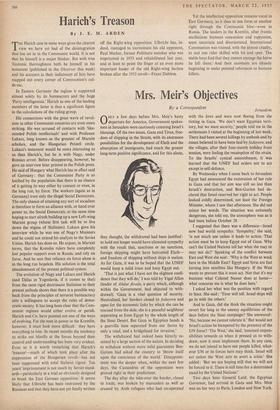Harich's Treason
By J. E. M. ARDEN rr HE Harich case in some ways gives the clearest view we have yet had of the disintegration that has set in in the Communist world. It is not that he himself is a major thinker. But with true Teutonic thoroughness both he himself in his testament (published in the Observer this week) and his accusers in their indictment of him have mapped out every corner of Communism's cul- de-sac.
In Eastern Germany the regime is supported almost solely by its bureaucrats and the huge `Party intelligentsia.' Harich as one of the leading members of the latter is thus a significant figure in the calculations of the ruling group.
His connections with the great wave of revul- sion in other Communist countries are even more striking. He was accused of contacts with 'like- minded Polish intellectuals' and with Professor Lukacs, long known as the greatest of Marxist scholars, and the Hungarian Petoefi circle. Lukacs's testament would be more interesting to us than Harich's, but he is with Nagy, under Russian arrest. Before disappearing, however, he gave an interview later printed in the Polish press. He said of Hungary what Harich has in effect said of Germany : that the Communist Party is so loathed by the population that there is no chance of it getting its way either by consent or even, in the long run, by force. The workers (again as in Germany) trust only the illegal Social Democrats. The only chance of attaining any sort of socialism is therefore to form an alliance with, or hand over power to, the Social Democrats, at the same time hoping to start afresh building up a new Left-wing Marxist group (whose first task will be to live down the stigma of Stalinism). Lukacs gave his interview while he was one of Nagy's Ministers and he could not extend his analysis to the Soviet Union. Harich has done so. He argues, in Marxist terms, that the Kremlin rulers have completely lost popular support even in Russia, and rely on force. And he sees that reliance on force alone is in the long run hopeless. His solution is the total abandonment of the present political system.
The evolution of Nagy and Lukacs and Harich (and Djilas in Yugoslavia, if it comes to that) from the most rigid doctrinaire Stalinism to their present attitude shows that there is a possible way back from the principles of, terrorist bureaucracy into a willingness to accept the rules of demo- cratic society. It has long been clear that the Com- munist regimes would either evolve or perish. Harich and Co. have pointed out one of the ways of evolving. For the men in power in the Kremlin, however, it must look more difficult : they have everything to lose. In recent months the tendency to strike out blindly at the forces beyond their control and understanding has been very evident. Even so it is worth remarking that Harich's `treason-'—much of which took place after the suppression of the Hungarian revolt—has not been suppressed with total Stalinist rigour. Ten years' imprisonment is not much by Soviet stand- ards—particularly in a trial so obviously designed to break the East German opposition.• It seems likely that Ulbricht has been restrained by the Russians and that they have not yet finally written off the Right-wing opposition. Ulbricht has, in- deed, managed to incriminate his old opponent, Paul Merker, former Politburo member who was imprisoned in 1953 and rehabilitated last year, and at least to point the finger at an even more important leader of the old Right-wing faction broken after the 1953 revolt—Franz Dahlem. Yet the intellectual opposition remains vocal in East Germany, as it does in one form or another right through the Communist bloc—even in Russia. The leaders in the Kremlin, after frantic oscillations between concession and repression, seem uncertain and disorientated. International Communism was trained, with the utmost cruelty, to suit one rider skilled with bit and spur. The stable boys find that they cannot manage the horse he left them. And their assistants are already beginning to make pointed references to humane killers.


































 Previous page
Previous page